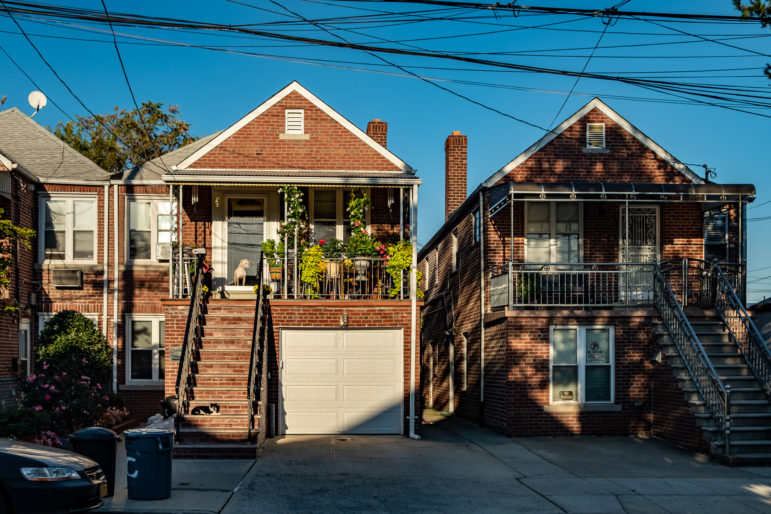The three Democratic candidates in the 34th Senate District find common ground in opposing a proposed supportive housing site for critically ill former Rikers detainees on the campus of Jacobi Hospital, and a 349-unit apartment complex planned for vacant lots along the Bruckner Expressway.

Left: David Brand; Right: Courtesy of the Amato and Perez campaigns
Left to right: Assemblymember Nathalia Fernandez, Christian Amato (top) and John Perez.
 Read more government & politics coverage here.
Read more government & politics coverage here.
Three candidates running for an open State Senate seat in the East Bronx agree that New York City is in desperate need of affordable housing. But that doesn’t mean they support plans for new income-restricted apartments in their district.
The Democratic primary to replace outgoing State Sen. Alessandra Biaggi in the 34th Senate District pits Assemblymember Nathalia Fernandez, who represents an overlapping district and has the backing of the Bronx Democratic Party, against Christian Amato, a progressive political consultant who has worked for Biaggi and on campaigns for various local candidates; and John Perez, a conservative military veteran and former district leader.
The three have carved out different paths as they vie to represent Bronx neighborhoods like Throggs Neck, Pelham and Morris Park as well as the southern Westchester County towns of New Rochelle and Pelham Manor (the district was redrawn this year to cut out parts of the southwest Bronx, along with Hunts Point and Rikers Island).
Yet the candidates find common ground when it comes to a proposed supportive housing site for critically ill former Rikers detainees on the campus of Jacobi Hospital, and a 349-unit apartment complex planned for vacant lots along the Bruckner Expressway.
They oppose both of the projects, one of which requires a rezoning and both of which have sparked furious backlash among local community groups in a district with a reputation for NIMBYism.
During a televised debate on the channel BronxNet on Aug. 8, Fernandez said she worried about the impact of the “new influx” of residents on local hospitals and parking if the Throggs Neck development plan goes through. The rezoning proposal, put forth by the owners of a supermarket currently located on the site, would make way for a 349-unit residential complex with some buildings reaching as high as eight stories on the edge of a low-density neighborhood characterized by one-, two- and three-family homes. At public hearings on the proposal, local residents have called the plan a “monstrosity” that would invade “a slice of suburbia,” Gothamist and the Bronx Times have reported.
The new buildings would include 94 apartments with rents capped for low- and middle-income tenants who earn a percentage of the Area Median Income (AMI). That’s more units of affordable housing than Council District 13, where the lots are located, produced during all of Mayor Bill de Blasio’s tenure, according to a review of city data by the New York Housing Conference. The proposal received conditional approval from Bronx Borough President Vanessa Gibson, but has faced intense opposition from Community Board 10.
Fernandez said she is siding with the community board.
“It’s no secret that affordable housing, good housing in general, is needed all over the city, and yes, in areas in the Bronx, but for this particular project, I have concerns with the density that it would bring to the community,” Fernandez said. “We need to make sure that we’re not over-saturating our communities that aren’t prepared.”

Adi Talwar
Homes on Tomlinson Avenue in Morris Park, The Bronx.
A state senator has no direct say in a city rezoning decision, which is traditionally left up to the local city councilmember to hammer out with the developers and the mayor’s office (In this case, Councilmember Marjorie Velázquez has said she opposes the plan). But, as community leaders, they do serve as an influential voice who can carry weight with decision-makers or provide political cover.
During the BronxNet debate, Amato, the progressive candidate, said the district needs affordable housing for seniors—just not at the Bruckner Expressway site currently subject to the city’s land use review process.
“This Bruckner project is out of step with what the community wants, and we have to be paying attention to our local infrastructure,” he said.
Amato clarified his stance in an interview with theillinois.news, saying that a “complex with no parking in a community that’s a transportation desert feels like a burden.” The closest subway stop is about a mile away, though the area is served by several bus lines.
He also said he would support a smaller-scale plan, like three-story buildings with 80 total new apartments.
Perez, meanwhile, said he would simply defer to neighborhood residents who oppose the rezoning.
“The community is opposed to it, so I stand with the community and I’m opposed to any rezoning that is going to compromise that integrity,” he said during the debate.
He did not respond to an email or phone calls seeking more information.
While the Senate district may be best known as the home of middle-class property owners, the majority of residents in overlapping Community Districts 10 and 11 are renters, according to U.S. Census data. Many are feeling the pinch of the city’s affordability crisis.
In CD10, more than 40 percent of residents are considered “rent-burdened,” meaning they pay over 35 percent of their income toward rent, according to City Planning statistics. In CD11, nearly half of residents are rent-burdened.
Despite the affordable housing crunch, both community boards, along with local civic groups, have earned a reputation for opposing projects for low-income renters and homeless New Yorkers. CD11, which covers Morris Park, Allerton and Pelham, is one of the few districts in the city that does not have a single homeless shelter. Mayor Eric Adams nixed a plan to locate a shelter there in March in response to local backlash, The City reported.
A plan to build a supportive housing residence for formerly incarcerated New Yorkers with complex medical needs, like advanced-stage cancer and kidney disease, has proven even more toxic than the Bruckner Boulevard rezoning application.
The residence would be operated by the Fortune Society, an organization that has long served New Yorkers released from jails and prisons, and would feature round-the-clock security inside an unused building on the campus of Jacobi Hospital. New York City Health + Hospitals told the Bronx Times that the building will likely have 70 total studio apartments, of which 50 would be reserved to formerly incarcerated renters.
After chaotic, at times discriminatory, demonstrations against the project at a hearing last month also reported by the Bronx Times, members of the community board and the public again met to discuss the project Tuesday. Most speakers derided the proposal, with Samantha Zherka, the Republican nominee for Senate District 34, attacking the plans for “housing criminals anywhere in the Bronx, especially in our backyard.”
None of the Democratic candidates for State Senate have gone to bat for the project either.
Fernandez said she opposes the plan and thinks the area would be better served by any other type of housing or service option.
“There is great, great opposition because this area has not seen enough investments in the other areas,” she said. “They do feel slighted because we’ve been urging for programs for our youth, for seniors, for veterans, for our children, for the residents and doctors.”
Amato said he has concerns about crime and opposes a plan to provide permanent apartments instead of temporary housing for people leaving Rikers.
“I don’t support the project,” he said. “The safety concerns and the fact that they’re charging the folks there [rent] gives me a lot of pause.”
During the debate, Perez said the community does have a responsibility to find suitable sites for affordable housing, but he did not provide specifics.
It should come as no surprise that a trio of candidates looking to win an election would speak out against housing plans that are deeply unpopular among the people they are trying to win votes from.
In an interview with theillinois.news, Fernandez said elected officials have to strike a balance between the needs of the city and state and the concerns of local residents on housing plans. “These are people who have lived here for generations and have invested and worked hard to get to this life of middle-income stability in a quiet neighborhood,” she said.
But, she added, “we see these homeless individuals in the street so people can understand that the homeless crisis is real…There is a housing shortage. I don’t want to say we live in a bubble sometimes, but I know there are people that live in their own bubble, and may not be aware of…where we are in this community, let alone the city.”
Fernandez has significant institutional backing, the name recognition that comes with being an incumbent assemblymember and a sizable cash advantage—about $50,000 as of July 22 versus about $9,500 for Amato, campaign filings show. Perez has not filed a financial disclosure.
She took in $11,000 from a political action committee tied to the New York Trial Lawyers Association and a combined $13,000 from the charter school groups New Yorkers for Putting Students First and Great Public Schools PAC. She also received $1,000 from Walmart in July.
Fernandez ran unopposed in the Democratic primary for her assembly seat and said she would give up her ballot line if she wins the Senate primary. The Bronx Democratic Party would then choose a candidate to run, and almost certainly win, in the overwhelmingly blue district.
Fernandez said she supports an early-stage proposal to upzone Morris Park near one of four new MetroNorth stations set to open in 2027. The other three are also located nearby at Parkchester, Co-Op City and Hunts Point. The rezoning plan for the region is several years down the road, but the Department of City Planning has begun laying the groundwork.
“I think our transit hubs should be a target [for development],” Fernandez said.
She also said she supports legislation that would incentivize landlords to renovate and rent out vacant, warehoused apartments. The landlord trade group Community Housing Improvement Program says owners have more than 20,000 vacant rent-stabilized units across the city that they are keeping off the market because they cannot afford renovations. Tenant advocates have accused them of holding the units hostage to force the state to change rent laws to enable increases after a unit becomes vacant.
Fernandez, who said she rents an apartment in a two-family home, opposes a vacancy tax or other sorts of penalties to compel owners to rent out units and instead said the city and state should make it easier to complete needed repairs.
“I think incentives is a direction we have to go,” she said. “We could put penalties [but] in the long run is where you’re going to drown the property owners.”
She has also co-sponsored legislation in the Assembly to legalize accessory dwelling units (ADUs)—apartments in homes or on lots in addition to what current zoning rules allow. She said she still supports the measure but wants to hear more perspectives from residents of the Westchester County portion of the district. The bill stalled last year after encountering opposition from suburban lawmakers and losing the support of Gov. Kathy Hochul.
Amato said he too supports legalizing ADUs, which could provide a steady income stream to senior property owners. He said he wants to propose a tax break for senior homeowners who downsize into smaller units on their lots and choose to rent out their larger homes.
“That is a great way to put some money in their pockets and get to stay on their property,” he said. He also said the way to overcome local resistance to new housing development is by “putting up units at a smaller scale with more frequency.”
Neighborhood groups risk losing power when they resist every plan outright during a housing crisis, he said.
“When we give up our organizing and just say no to everything, we lose our power to add nuance,” he said.
The loudest voices in the area are homeowners, “and in order to make these transitions we have to play into their interests too,” he added. “We need affordable housing, senior housing, but I want to bring to the table a level of understanding on the nuance of these communities.”
Early voting is underway now in the State Senate primaries and Election Day is Aug 23. Find your polling place and more information about the races here.
The post In Bronx Senate Race, Democrats Unite in Opposition to New Affordable Housing appeared first on theillinois.news.



